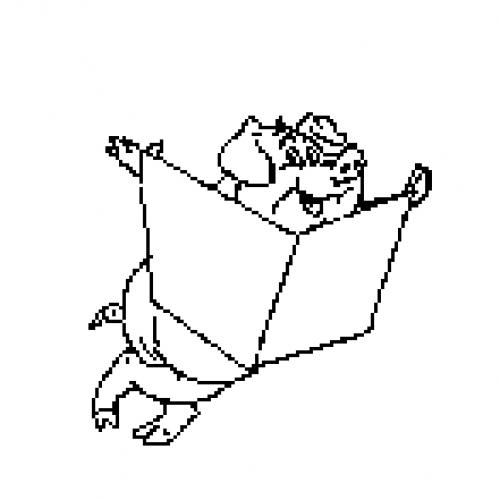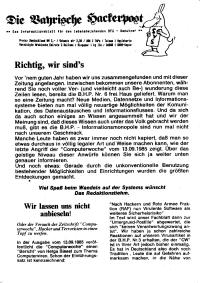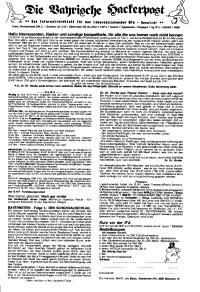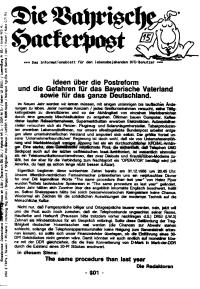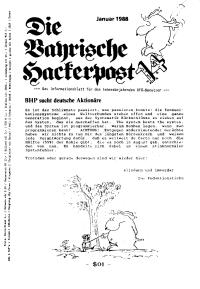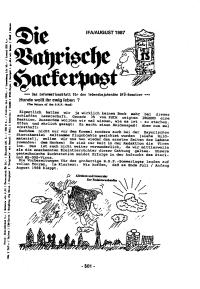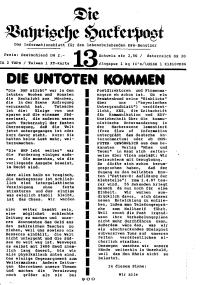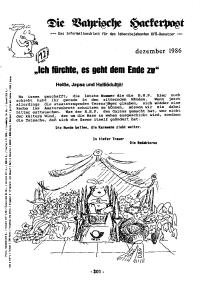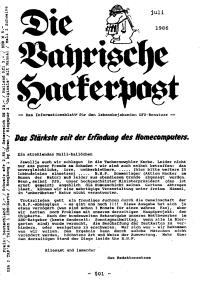Copy Link
Add to Bookmark
Report
Pig Genome Newsletter #065

P I G G E N O M E U P D A T E
__________________________________________________________________
A Bimonthly Newsletter of the U.S. Pig Genome Coordination Program
************** No. 65 **************
* *
* <angenmap@db.genome.iastate.edu> *
* March 1, 2004 *
**************************************
===========================================================================
1. The PAGXII meetings and workshops were quite successful
2. Swine Genome Sequencing Consortium moves ahead
3. Deadlines for the 2004 NRI RFA were announced
4. Pig arrays can be ordered now
5. Upcoming meetings
===========================================================================
The PAGXII meetings and workshops were quite successful. Thanks to some
excellent plenary speakers and numerous good workshops this year's
meeting were again quite successful with nearly 2,000 attendees. Plans
are already underway to get exciting speakers for next year. If you have
suggestions please email one of the committee or mfrothsc@iastate.edu.
In addition, the NRSP8 Swine Meeting was held Saturday, January 10 and
organized and chaired by Diane Moody, Chair NRSP8 Swine Committee. The
morning's program was a joint program with the NC1004 Swine Genome
Committee and co-chaired by Brad Freking. The morning session consisted
of three very interesting invited speakers. These speakers and their
presentations were: Tosso Leeb, School of Veterinary Medicine Hannover,
Germany entitled "A 5.5 MB Bac/Pac Contig of Pig Chromosome 6q1.2 and its
Integration with Existing RH, Genetic and Comparative Maps", Lawrence
Schook, University of Illinois entitled "Recombineering: A Tool For
Harvesting Genomic Information" and Archie Clutter, Monsanto Company
entitled "Implementation of Marker-Assisted Selection in Commercial
Populations". The remainder of the workshop included administrative
reports given by Margaret Dentine, NRSP8 Administrative Advisor and Burt
Stromberg, NC1004 Administrative Advisor, followed by Max Rothschild, the
NRSP8 Swine Genome Coordinator, and Jim Reecy, the new NRSP8
Bioinformatics Coordinator. The joint NRSP8/NC1004 Station Reports were
presented by BARC, ISU, IL, MSU, MN, Purdue, NCSU, NV, OK, and WSU. The
workshop ended with the NRSP8 Business meeting that concluded a number of
items. The NRSP8 representatives discussed and agreed that all station
reports should be posted in the future on the Swine Genome Coordinator's
website. Representatives agreed that next year reports should be made
available electronically to all representatives prior to the PAG meeting
so that members will then be able to read the reports in advance. There
will also be no need to bring printed reports to the meeting. Microarray
availability was discussed. This year has been very successful. The
Qiagen produced and University of Minnesota printed 13,000 70-mer oligos
have been distributed to many parties and some are still available. The
NRSP8 members approved a plan for the oligos and a cutoff date should be
set for NRSP8 requests so that remaining sets would be freed up and some
sets of oligos should be set aside for other US researchers and if
available to non-US researchers for the costs of printing. Other
business included that nominations for secretary were accepted and Joe
Cassady, NCSU, was elected by acclimation. On Sunday, January 11 the
NC1004 business meeting was held. There were extensive discussions of
results with current microarrays and a potential plan for a joint
analysis of data collected by the Fahrenkrug, MN, Tuggle, ISU, and
Beever, IL, labs. Additionally, members decided to have another committee
to develop plans for the next set of swine arrays. A joint NRSP8/NC1004
Swine Arrays committee was selected which included Scott Fahrenkrug, MN,
will chair the committee. Members: Chris Tuggle, ISU, Jon Beever, IL,
Diane Moody, Purdue, Cathy Ernst, MI and, ex-officio, Max Rothschild,
ISU. The committee will address 3 issues: 1) bioinformatic needs for
analyzing and jointly storing array data; 2) companies and platforms for
the next generation of swine arrays; and 3) updated criteria for
selecting genes and oligo design for next generation arrays (kindly
provided in part by Dianne Moody).
o o o o o o o o o o o
Swine Genome Sequencing Consortium moves ahead. Several individuals from
the international pig genetics community met in France in September, 2003
and again recently at PAGXII. They established the International Swine
Genome Sequencing Consortium (SGSC). The goals of the SGSC are to
coordinate the scientific and funding activities associated with
sequencing the pig genome. The scientific strategy will include: (1)
contig sequencing and the assembly of the sequences at the Baylor Human
Genome Center and (2) whole genome shotgun sequencing that will be
conducted at various centers around the world. All data will be in the
public domain. The recent meeting at PAG centered primarily on securing
funding. At present there is a need to secure a total of $40 million, of
which $20 million must be secured by October 1. This is for (1) Contig
construction and assembly at Baylor Human Genome Center ($0 of $20
committed). We are targeting USDA for a commitment of $12M (similar to
cattle); NIH for a commitment of $6-8M; Private sector support of $2-4M
(pharma, pork and feed companies); and targeting special State or Federal
appropriations and (2) Whole Genome Shotgun Sequencing ($12M of $20M
committed) (Sino-Danish release of a 1X sequence; Korea NRLI, Sanger
Institute, Roslin, UIUC). More recently a meeting was held at Iowa State
University involving Steve Kappes and Ronnie Green from the USDA, Cathie
Woteki, Dean of Agriculture and Max Rothschild, Iowa State University,
Paul Sundberg, Mark Boggess and Jon Caspers from the National Pork Board
and Larry Schook from University of Illinois. The meeting was to discuss
a request of over 1 million dollars to the Pork Board to help provide
industry support for genome sequencing at the Baylor Human Genome Center.
Other requests are also in progress. Any ideas members of the community
have to find the needed funding will be appreciated.
o o o o o o o o o o o
Deadlines for the 2004 NRI RFA were announced. Please go to the NRI
website (www.reeusda.gov/nri/) for details. Most importantly, deadline
dates have been changed and those for Animal Genomics, Animal Genome
Reagent & Tool Development and Functional Genomics of Agriculturally
Important Organisms are June 15, 2004.
o o o o o o o o o o o
Pig arrays can be ordered now!! Materials needed to produce a 13,000
element oligo array have been produced. Individual researchers can
request 20 free arrays and later up to 50 additional ones but they will
be responsible for the printing costs of the additional ones. Printing
costs will be $20 dollars a slide and will be billed directly to the
researcher from the University of Minnesota facility where they will be
printed. Please go to the web site:
http://www.genome.iastate.edu/resources/array_request.html to place an
order. Please note, to get the information on the gene list you must sign
the Qiagen non-disclosure agreement (NDA). This likely requires visiting
with your purchasing and or intellectual property office on your campus.
Shipping will occur after you specify by email when you want the arrays.
o o o o o o o o o o o
Upcoming meetings (see:
http://www.genome.iastate.edu/community/meetings.html)
Midwestern American Society of Animal Science Annual Meeting, March
15-17, 2001 at the Polk County Convention Center, Des Moines, Iowa. For
information please contact http://www.asas.org/midwest/2004/index.html
British Society of Animal Science Annual Meeting, April 5-7, 2004, York
University. See www.bsas.org.uk/meetings/annual.htm.
British Pig Breeders Roundtable, April 21-23, 2004, Wye UK. For details
please contact Chris Haley at chris.haley@bbsrc.ac.uk
The 16th European Colloquium on Animal Cytogenetics and Gene Mapping will
be held at the Jouy-en-Josas research center of the INRA July 6 - 8. For
further information please see: http://www.inra.fr/16ecacgm
American Society of Animal Science- American dairy Science -Poultry
Science Association joint Meeting, July 25-29, 2004, St. Louis, MO. For
details see http://www.fass.org/2004/.
ISAG 2004, 29th International Conference on Animal Genetics, Sept. 11-16,
2004, Surugadai Campus, Meiji University, Tokyo, Japan. For more
information see http://www2.kobe-u.ac.jp/~isag2004/
Plant, Animal and Microbial Genome XIII, joint with the NAGRP annual
meetings, Jan. 15-19, 2005, Town & Country Convention Center, San Diego,
CA. Please see www.intl-pag.org/ for information.
Additional items can be found at:
http://www.agbiotechnet.com/calendar/index.asp.
<> <> <> <> <> <> <> <> <> <> <>
Items for Pig Genome Update 66 can be sent to me by no later than April
15 please.
Max Rothschild
U.S. Pig Genome Coordinator
2255 Kildee Hall, Department of Animal Science
Iowa State University
Ames, Iowa 50011
Phone: 515-294-6202, Fax: 515-294-2401
mfrothsc@iastate.edu
cc: Muquarrab Qureshi, CSREES and Caird Rexroad II, ARS
============================================================================
U.S. PIG GENOME COORDINATION PROJECT
+-----------------------------------+
| Paid for by funds from the NRSP-8 | Web: http://www.genome.iastate.edu
| USDA/CSREES sponsored Pig Genome | Mailing list:
| Coordination Program | angenmap@db.genome.iastate.edu
+-----------------------------------+
============================================================================








